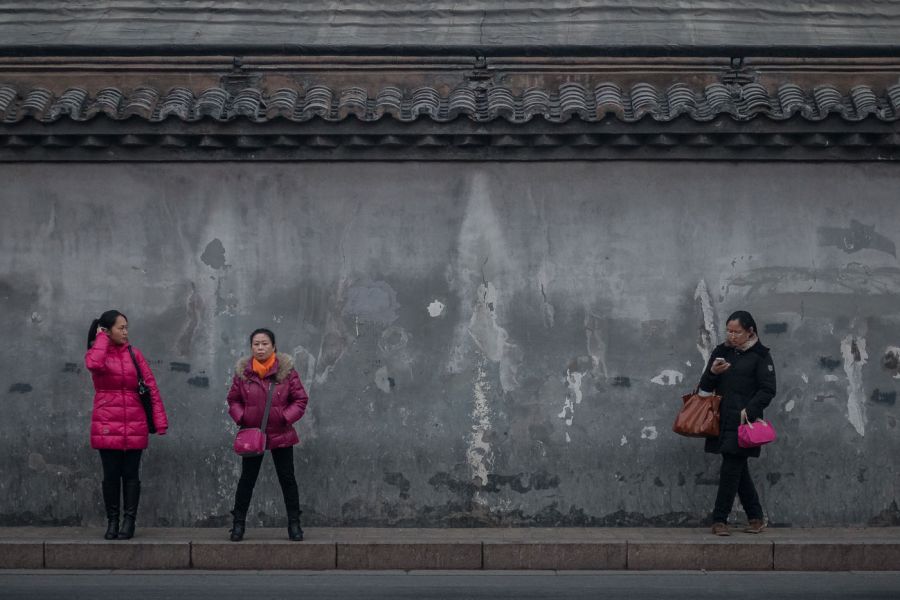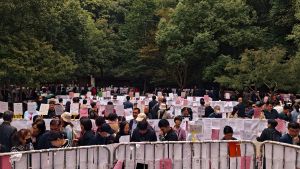
Taking a Step Back to Conduct Research and Liberal Feminism as a Theory of Action
I was born into a rural Chinese family which had only one child for three generations. I pursued studies in the field of political philosophy. The discipline of philosophy, and especially that of political philosophy, is a disaster area when it comes to sexism across the world. Thus, as one of only a very few female scholars in the field of political philosophy in China, I was already aware of some feminist theories that had been introduced into China before the ‘Feminist Five’ incident and had already reflected on what my identity as a woman could bring to my research. Nevertheless, before that incident I had never formally incorporated feminism into my field of research. There are two kinds of feminist theory most prevalent in China today: the critique of capital in Western Marxist feminism and the analysis of structures of micropower in postmodern feminism. In contemporary China, where political transformation is yet to be achieved, these two theories can permit discourse among people to occur on condition it does not directly contradict the ideology of the Party-State (to the extent that it can even constitute a kind of collusion). Theorists are thus able to access some relatively tolerant space for action and to facilitate the awakening of women’s consciousness of their own autonomy. As a political scientist, though, I strongly believe that women’s rights, as a part of human rights and perhaps also as (at least in certain respects) the gravest part of the human rights disaster, cannot be improved in isolation from the overall institutional environment in China. Before the ‘Feminist Five’ incident, the seriousness and urgency of the question of women’s rights were less prominent than other topics in the field of human rights in China. Because of this, I was not in any great hurry to develop an alternative feminist theory.
Doing Something
On the eve of International Women’s Day in 2015, the Chinese Government suddenly began to take a heavy-handed approach to the issue, arresting and detaining five feminists simultaneously in multiple provinces and cities. I was horrified and shocked by this. We could not understand how a few young women taking to the street to protest sexual harassment on public transport could be seen as politically inflammatory or subversive. But the way the government handled the situation implied that this was precisely how the officials in charge saw it. I was also deeply irritated by the collective silence in the sphere of public opinion, which was still very active back then, as though young women being severely punished for no reason, their rights trampled by the public authorities, were not worthy of being helped and supported. I felt obligated to do something for them.
A style of intervention through research would allow me to embed my awareness of problems in highly specialised topics, so that my reflections on the pain and anxieties that result from my personal experiences could resonate with more general contemporary perplexities. As a scholar engaged in philosophical research, this is how I have consistently put my concern for reality into practice. Thus, after the ‘Feminist Five’ incident, I changed the direction of my research and began to think seriously about and respond to problems of women’s rights in China. But, of course, this is not necessarily a result of self-censorship.
Before this, as an alumnus of Peking University (PKU), I had initiated and participated in a number of protests directed at the leadership of PKU, and I was extremely lucky to get away with it without being punished. These experiences have provided me with more space for expression than other feminist activists and researchers in China, which allows me to discuss most feminist issues with a reasonable degree of safety. It is probably because of this, though, that my actions have been more restricted than those of others. During the storm around the Shen Yang case at PKU in 2018 [when multiple students at the university used their verified social media accounts to denounce Professor Shen Yang for sexually assaulting and causing the suicide of a female student in the 1990s], the former student who had initiated the request for disclosure of information about the case put me on speakerphone when she answered my call while she was being interviewed by the authorities. This led to a sudden, overnight escalation of the PKU authorities’ assessment of the incident.
The university authorities interviewed many of the students who participated in the request for the disclosure of information multiple times, vigorously pursued what they called ‘forces beyond the campus and foreign powers’, and called the students things like ‘subversive’, ‘treasonous’, and ‘secessionist’. They also forced the students to sever all ties with me and to withdraw from the anti–sexual harassment movement. Other students, who had no direct contact with me, blamed my involvement for the change in the nature of the movement, believing the sensitivity of my status in the eyes of the authorities had been responsible for its transformation into a politically sensitive incident, which in turn endangered other participants. At that point, the anti–sexual harassment movement at PKU, which had at one point attracted nationwide attention, died out, having achieved nothing concrete. I was also compelled to write a series of articles to clarify the ins and outs of my involvement in the affair, to avoid being framed as the ‘behind-the-scenes manipulator’ of the PKU movement, which could have been disastrous. The institution I was working for at the time could not wait to get rid of me, and I was forced to look for another job.
Thinking Rather Than Action
Although I have had a lot of experience in public participation, I am aware that my strengths lie in thinking rather than action. Breaking out of an iron room requires more than courage; to act recklessly is to sacrifice yourself for nothing. I do not wish to be a martyr, nor do I encourage anyone else to be one. Instead, I expect to take a step back when faced with a reality that seems completely hopeless and to reflect on the possibilities of taking a broader approach to breaking through. In a totalitarian society, free thinking itself is dangerous. I feel the best way for me to contribute to women’s rights in China is to keep my focus on the field of action while utilising any influence I have previously accumulated and the advantages of my interdisciplinary research to bring gender issues to bear on a variety of disciplines, so that scholars from different backgrounds can approach gender issues from their own perspectives. This will increase the presence of these issues within the intellectual world in China.
However, when I began to use the means available to me to try to promote, to the best of my ability, attention to gender issues among my peers in China and to advocate ‘heforshe’ [a solidarity movement for the advancement of gender equality] in a male-dominated world, I came to realise I had not only stepped into a cutting-edge field of inquiry, but also attracted quite widespread hostility from people I had thought of as fellow liberal scholars. I gradually became aware that because men have long maintained a monopoly on the discipline of philosophy both in China and elsewhere, and because philosophy, and especially political philosophy, has been a disaster in terms of sexism even outside China, these men who advocate and spread ideas of liberalism and equality in mainland China have failed to take account of the criticisms of the gender discrimination embedded in Western philosophical traditions, and especially political philosophy, which have been advanced by feminist scholars since the 1980s.
They have also underestimated the difficulty of establishing gender justice in a patriarchal society. Despite paying lip-service to the idea of gender equality, most regard gender discrimination as simply a problem of the personal moral character of others. They can discern neither the structural gender discrimination that is sustained by both culture and custom nor how the subtle influences of culture and custom on the formation of their personalities, their habits, and their patterns of interpersonal interaction shape gender inequality. They are even more reluctant to acknowledge or lose all the tangible and intangible benefits they, as men, receive from unjust cultural, customary, and social structures. To avoid having their sense of their own goodness undermined by me and to be able to continue enjoying the ‘gender dividends’ that patriarchal society has offered them in comfort, some colleagues whom I used to respect, including teachers and friends, have jumped on me in exasperation and ordered me to shut my mouth; some have even kicked me out of their communities. I can only feel regretful about this.
But it has also prompted me to reflect on these phenomena. It helped me realise that the lack of gender consciousness among liberals in contemporary mainland China is a longstanding, chronic problem that has pushed a new generation of feminists away from liberalism, and this in turn may have produced fatal obstacles to the cause of liberalism. Perhaps, though, as a scholar of political philosophy who identifies with both liberalism and feminism, my thinking and research may serve as an effective remedy for this chronic problem.
An Incomplete Liberalism
Allow me to try to explain my views as succinctly as possible.
Since the beginning of the period of Reform and Opening Up, Chinese liberals, while demanding the modernisation of the political system, have at the same time mostly advocated a return to tradition when it comes to gender issues. This is a form of collective unconsciousness that has never yet been seriously reflected on. Tiananmen activist Yuan Zhiming’s sexual assault of fellow activist Chai Ling in 1990, poet Gu Cheng murdering his wife 25 years ago, dissident Wei Jingsheng sexually assaulting Singtao Daily reporter Liu Huaizhao 20 years ago, and the many cases of sexual harassment that were revealed in the not-for-profit sector in 2018—all these cases represent only the tip of the iceberg. Accordingly, when Western liberalism was introduced to China, liberal feminism was often ignored, whether intentionally or not. As a result, the new generation of feminists in China who emerged after the 1995 World Conference on Women were unable to draw on the intellectual resources of the liberalism that had been introduced to mainland China and thus were compelled to turn to Marxist and postmodernist feminist theories, which were rather inappropriate in the circumstances. This is certainly a loss for the feminist movement in China, but it has also deprived liberals in mainland China of an invaluable ally (Li 2013; Zeng 2016).
As discussed above, in China, where political transformation is yet to be completed, the demand for women’s rights must go hand in hand with demands for other human rights like freedom of speech, freedom of association, and universal suffrage. This is not only because the demand for women’s rights requires changes at the levels of law and policy, but also to empower women, who are relatively disadvantaged in every social stratum, so women in unequal power relationships can say no to nonconsensual intimacy, sexual contact, and reproductive activity rather than having to compromise out of concern for their livelihoods. It is also because the demand for women’s rights requires men to change longstanding patterns of behaviour, to learn to respect women’s desires and freedom, to work together with women to comprehensively reshape the social structure as well as public culture, to ensure that every individual is treated with equal respect, and the care of the disadvantaged and marginalised is prioritised.
This last point is undoubtedly also the goal of liberals; in fact, the series of crackdowns following the ‘Feminist Five’ incident has contributed to an awakening of political consciousness in some activists in feminist circles that had previously been politically apathetic. Therefore, when hopes of top-down reform were dashed, the feminist movement—with its emphasis on mental rather than physical strength, brought about by industrialisation, and with the theoretical and practical support of liberals—could have, by addressing numerous minor but pragmatic issues, nurtured a social constituency involving both sexes that was broad enough and sufficiently equipped with the spirit of autonomy to implement a spirit of liberalism in daily life, thereby propelling the political transformation of Chinese society from the bottom up.
But liberals in male-dominated China thought too highly of themselves, so they did not realise the feminist movement’s potential to mobilise. They were even more unable to realise that returning to tradition and reestablishing the system in which men were noble and women were base, in which men worked outside and women remained inside, and in which men ruled and women obeyed would be like climbing trees to catch fish when it came to their political aims. In the I Ching, it says: ‘The relationship between husband and wife is the starting point of human relations.’ Gender inequality was both the prerequisite and the basis of the social hierarchy in China under Confucianism. Every revolution in China since 1911 has failed to fundamentally shake this foundation and, as a result, new hierarchical structures could ceaselessly be reborn from it. As an aside, the political regression in recent years has marched in step with the revival of Confucianism as well as the popularisation of classes of ‘female morality’. To eradicate the idea of hierarchy from Chinese people’s minds and destroy the social foundation for the reemergence of hierarchical systems, it is necessary to continue the unfinished revolution in the family and society that began with the May Fourth Movement, and to see the gender revolution through to its conclusion.
In view of this, my recent research on women’s rights can be divided into two aspects. One is to explain the fundamental role of gender politics in Confucian political philosophy and its continuing influence on the Han in contemporary China from a historical and comparative perspective. The other aspect seeks to fully integrate gender issues, human rights discourse, and theories of justice by building on Amartya Sen and Martha C. Nussbaum’s research on Indian women’s experiences of poverty and thereby to construct a feminist political theory grounded in the Chinese context. Conclusions from the first part of my research have already been mentioned here, so in the following I will focus on the findings of the second part.
Reinvigorating Liberalism and Feminism
I call the feminist political theory I have attempted to construct ‘Rawlsian feminism’, because it does not use intuitions from the theories of Marx and Aristotle to propose core capabilities, as the work of Martha Nussbaum does. Rather, the selection of the principles of justice by representatives in the original position is placed in the context of global migration, and the set of basic social facts that people under the veil of ignorance ought to know is revised. Reproduction and the physiological differences between the sexes are placed at the centre. According to Rawls’ minimax criterion, then, a list of core interests for the most disadvantaged group—women—is selected as a plan acceptable to everyone. The core interests selected in this way include:
- The opportunity to be born. This concerns the issue of foetal sex selection rather than opposition to abortion.
- The capacity to be in good health. This includes access to sufficient nutrition and nurturing (especially in infancy and early childhood) as well as proper medical treatment and health care.
- The capacity to control one’s own body. This capacity protects women from sexual harassment, sexual assault, domestic violence, and other forms of sexual violence in their pursuit of sexual satisfaction and ensures their right to make decisions about reproductive matters (including the right to abortion). It also ensures women’s right to modify their bodies through surgery or other means (such as tattoos, gender reassignment surgery, and using oral contraceptive pills to stop menstruation), and their right to practice sexual abstinence. It also includes other rights relating to privacy (such as rights over images of oneself). The capacity to control one’s own body requires a series of supporting capacities and legal rights and freedoms, as detailed in items (4) to (6).
- The capacity to exercise practical reason. This is one of the supporting capacities related to the capacity to control one’s own body. Having this ability, women can plan every aspect of their lives, including their views on sex, love, intimacy, marriage, family, and other issues, and can deal with all the practical problems associated with these issues. The development and use of the capacity to exercise practical reason also require a series of supporting rights and freedoms, at the core of which are freedom of thought, conscience, and belief, freedom of speech and of the press, and freedom of association. On the one hand, these rights and freedoms allow women to plan their own lives with autonomy, including what they do with their bodies; on the other hand, they also help women to identify nonconsensual sex and unwanted pregnancy and provide them with both the desire to seek assistance when they experience sexual violence and the avenues to do so.
- The capacity to be economically independent. This is another supporting capacity related to the capacity to control one’s own body. The ability to practise this also requires a series of supporting rights, such as the right to own property, the right to inherit, to education, to work, to choose one’s occupation, to migrate, and so on. Having and exercising these rights allow women to say no to sex and intimacy that they do not want and give them the capacity to break away from acquaintances (bosses, husbands, boyfriends, and so on) who are sexually violent towards them rather than being compelled to submit out of fear for their livelihood.
- Other rights and freedoms of a protective nature: These include legal systems and judicial practices that can provide institutional guarantees for the aforementioned capacities and rights, and mechanisms of public participation that make such legal systems and judicial practices both possible and stable (such as equal civil freedoms, equal political freedoms, an environment characterised by the rule of law, and the right to civil disobedience). These also include mechanisms of exit as a remedy of last resort (such as the freedom to learn foreign languages, the freedom to communicate with people in other countries, the freedom to travel abroad, the freedom to exchange foreign currencies, and so on).
- The capacity to access care. This includes both pregnancy checkups and postpartum care paid for by the state, paid maternity leave, and paid paternity leave, as well as childcare subsidies, the provision of medical insurance to low-income earners, and the use of public funds to support disabled children, orphans, and elderly people on low incomes. It also includes the prohibition of sexual relations with women who cannot give sexual consent independently due to mental incapacity.
Although each item in this list was selected based on women’s lived experiences, clearly none of them is solely applicable to women. Rather, because women are in a relatively disadvantaged position in every group and social stratum, a list of core interests that provides protections for women can also extend to the needs of men.
The opportunity to be born is given as the first and most important item on this list because it is based primarily on the experiences of Chinese and Indians, even though it is incompatible with existing systems of discourse concerning capacities and rights. It is also for this reason that I call the items on this list core interests rather than core capabilities, as Nussbaum does.
Feminist Liberalism
Certainly, this theory is a type of liberal feminism, but it can also be described as a feminist liberalism. In placing the issue of reproduction and the physiological differences between the sexes at the centre, and stipulating control over one’s own body as the most important core interest, this theory establishes connections between feminism and liberalism and makes what some anti-feminist theorists call ‘the dilemma of difference versus equality’ a false problem. Moreover, this theory follows in the tradition of Benjamin Constant and Isaiah Berlin in treating the value of political life as a second-class value, although this does not mean it disregards the protective functions provided by political freedoms.
This research is still in its early stages, but I have already received feedback from some feminists who have told me that they are very inspired by it. I hope that as this research moves forward and is improved, it will compel male liberals who have consistently ignored gender issues, whether intentionally or not, to acknowledge their theoretical blind spots and to seek actively to form alliances with the feminist movement. This would also mean that I could live and work in a more friendly environment. At that point, my two identities— ‘researcher’ and ‘activist’—would be fully reconciled.
Featured image: Three Women, by Matt Ming (CC) .
Translated by Jamie LIU, edited by Malcolm THOMPSON.





